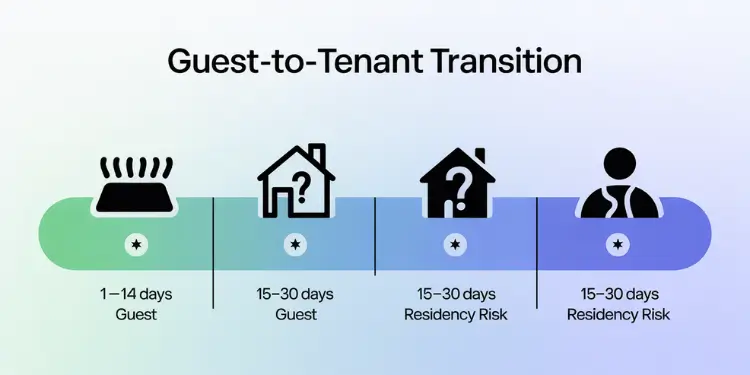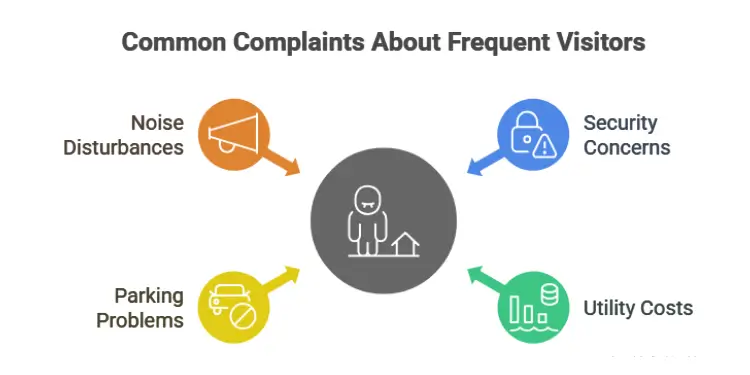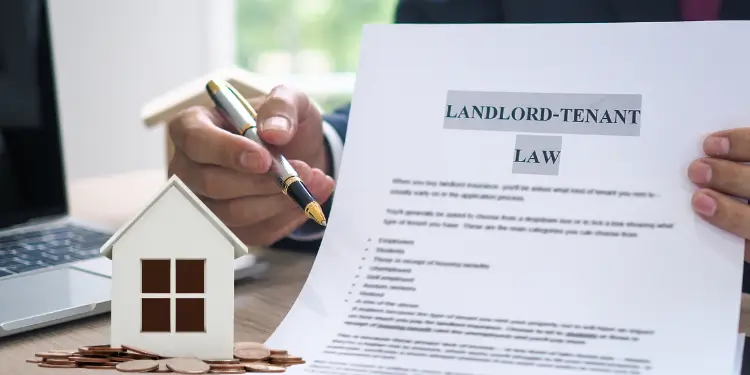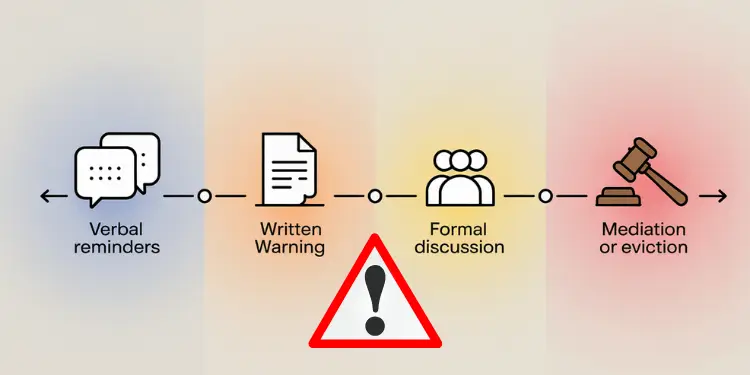The overnight guest clause in your lease can really limit who visits your home. I’ve seen it cause more fights than almost any other issue in nine years at Ogden legal clinics. Have you ever thought about why landlords are so strict about who sleeps in your apartment?
A big 67% of American renters don’t know their visitor rights under state law. One tenant told me, “I never thought I’d need a lawyer for my sister to stay during her cancer treatments.”
I’ve fought against many strict visitor rules in court. Landlords say it’s for “property protection,” but courts often say it’s too much. They think it’s too much of an invasion of privacy.
Your lease is a contract, not a way for landlords to control your life. Knowing the legal limits of visitor rules helps you stand up for your rights when problems come up.
The overnight guest clause establishes quantifiable limits on temporary occupancy by non-tenants, typically capping consecutive stays at 7–14 days and aggregate days at 10–30 per 6- or 12-month period. State statutes override lease language that is more restrictive than local habitability or anti-discrimination standards; documentation of landlord consent (written addendum or email acknowledgment) is required for any extension beyond the stated threshold to avoid re-characterization of the guest as an unauthorized occupant.
Enforcement hinges on progressive notice: verbal reminder → written warning → formal “cure-or-quit” notice → eviction filing. Landlords must observe the implied covenant of quiet enjoyment and statutory entry protocols; intrusive monitoring (surveillance, unannounced inspections, discriminatory enforcement) constitutes harassment and may trigger damages or lease termination in favor of the tenant.
Quick hits:
- Standard leases allow 7-14 day visits.
- Written permission often required for longer.
- State laws override unreasonable restrictions.
- Document all communication with landlord.
- Courts favor reasonable tenant accommodations.
Importance of guest policies in leases
A good guest policy is key to a fair landlord-tenant relationship. In my nine years at legal aid clinics, I’ve seen many problems solved with clear guest rules. These rules are not just to control who comes over. They protect everyone’s rights.
Guest policies stop people from becoming de facto tenants without checks. In most places, staying 14-30 days can give someone residency rights. This can cause big legal problems for landlords and threaten your own stay.
From the landlord’s side, these rules protect their property. They make sure all adults living there have been checked and agree to the rules. For tenants, these policies keep the building safe and livable. They also stop neighbors from adding unapproved roommates.
The best guest policies know the difference between occasional visitors and long-term guests. Your lease should say how many nights a guest can stay (usually 7-14 days). It should also say how many nights a month (often 10-20) before you need to tell the landlord.

Common Complaints About Frequent Visitors
I’ve worked with landlords and tenants for years. I’ve seen four main problems with frequent guests. Knowing these can help you understand your rights and respect property concerns.
Security is a big worry for landlords. Unchecked guests can make buildings less safe. This can mess up security systems like key fobs and cameras.
Utility costs are another big issue. When guests use a lot of water or electricity, it can increase costs. This can be a problem for landlords who pay for these things.
Parking problems are common too. If guests take up visitor spots, it can upset neighbors and management. Your lease might say who gets to park where.

Noise is the last big complaint. Guests having parties late at night can disturb neighbors. Everyone has the right to quiet, but so do you.
| Reasonable Guest Restrictions | Potentially Unreasonable Restrictions | Legal Enforceability |
|---|---|---|
| 14-day maximum consecutive stay | No overnight guests whatsoever | High for reasonable; low for blanket prohibitions |
| Guest registration for building security | Approval required for any visitor | Medium; depends on implementation |
| Limits on total guest days per month | Restrictions targeting specific relationships | High if applied equally; low if discriminatory |
| Additional occupant fees after extended stays | Excessive fees for occasional guests | Medium; must be proportional to actual costs |
Courts usually support guest rules that solve specific problems. Landlords can limit long stays but can’t stop all visits. They can’t make rules that stop you from having friends over.
When you get a new lease, check the guest clause right away. Don’t wait until it’s too late. If the rules seem too strict, talk to your landlord about changing them.
Keep all guest-related talks in writing. If your landlord says it’s okay for someone to stay longer, send them an email about it. This can help if there’s a problem later.
“Read More: Top lease clauses tenants should know before signing“
Balancing privacy and property security
Tenants have the right to privacy, but landlords want to keep their property safe. This creates a balance in guest policies. It’s a big issue in many disputes.
Courts say both sides need to be respected. I’ve helped many tenants with guest policy issues. The question is always: Is this rule for safety, or to control you?
“The right to host guests in one’s home—whether owned or rented—is a fundamental aspect of personal autonomy protected by common law traditions of quiet enjoyment.”
Landlords can’t spy on your guests or ask for ID without a good reason. They can’t make rules that are unfair to certain guests. These actions are against your privacy and right to enjoy your home.
Blanket bans on overnight guests are unenforceable in many jurisdictions; courts strike down clauses that override state statutes protecting tenant privacy Ref.: “wendyd4rl1ng (2025). No overnight guests. CA.” [!]
Landlord Duty of Reasonable Accommodations
Landlords must make exceptions for guests with disabilities or family needs. This is because of fair housing laws. I’ve helped many get these exceptions.
If you need a caregiver, your landlord can’t make rules for them. Family members helping you also need fair treatment.
To get these exceptions, follow these steps:
- Write a clear request explaining why you need it
- Include health documents if needed
- State what change you want to the guest policy
- Keep all your talks with your landlord
Accommodations must be fair and not too hard for the landlord. You need to show it’s really necessary, not just what you want.

Tenant Expectation of Quiet Enjoyment
Your “covenant of quiet enjoyment” protects you from landlord overreach. It lets you use your rental peacefully and privately. It affects what rules landlords can make for your guests.
I’ve fought against “morality clauses” that ban guests of the opposite sex. Courts often say these rules are too invasive. They can also be unfair to certain groups.
But, tenant rights aren’t everything. Landlords can make rules for safety and to keep the peace. They can ask guests to stay with you, ban violent guests, and set limits on stays.
The main thing is if the rules are really for safety or just to control you. Your lease can set rules for safety and respect, but not for your personal choices.
| Tenant Rights | Landlord Rights | Gray Areas |
|---|---|---|
| Host occasional overnight guests | Set reasonable limits on stay duration | Definition of “occasional” vs. “residing” |
| Privacy in personal relationships | Protect property and other tenants | Guest behavior affecting neighbors |
| Reasonable accommodations for care needs | Prevent unauthorized occupancy | Long-term caregivers’ status |
| Freedom from discriminatory restrictions | Enforce occupancy limits per unit | Frequent visitors who don’t technically “live” there |
If you think your landlord is being too strict, keep records. Write down any times you feel watched or treated unfairly. This can help if you need to go to court.
Most guest policy issues can be solved by talking things out. When you talk to your landlord, focus on your privacy rights. Don’t just say you don’t like the rules.
“Related Topics: Basic lease agreement terms every renter must read“
Defining permissible overnight stay durations
Good lease agreements have clear rules for overnight guests. I’ve worked in legal aid for nine years. Many disputes come from unclear guest rules.
Courts usually side with specific time limits over vague rules. This makes things clearer for everyone.
“A reasonable guest policy must define specific timeframes and notification requirements. This way, it doesn’t interfere with a tenant’s right to quiet enjoyment.”
Most courts agree on a three-tier system for guest rules:
- Short-term guests (1-3 nights) – No need to tell the landlord
- Medium-term guests (4-14 nights) – Tell the landlord in writing
- Long-term guests (14+ nights) – Need formal permission or a lease change
State laws vary a lot. For example, California and Florida say someone is a tenant after 7 nights. But Alabama and Ohio wait until 30 days.
Some states count days differently. Connecticut and Colorado say someone is a tenant after 14 days in 6 months.

It’s very important to know your local laws about guest rules. What’s legal in one state might not be in another.
| State | Tenant Status Threshold | Notification Required | Maximum Guest Days |
|---|---|---|---|
| California | 7 consecutive nights | After 3 nights | 14 days per 6 months |
| Florida | 7 consecutive nights | After 2 nights | 15 days per 6 months |
| New York | 30 consecutive days | After 7 nights | 30 days per year |
| Texas | 14 consecutive nights | After 5 nights | 21 days per 6 months |
| Ohio | 30 consecutive nights | After 7 nights | 30 days per year |
When you’re talking about your lease, pay attention to guest rules. Some leases say how many nights you can have guests. Others talk about how many nights in a row.
“Further Reading: Maintenance responsibilities clause what tenants“
Documenting Guests Within Written Permission Forms
Having the right paperwork is key when you have guests for a long time. Always use the landlord’s official form for guest registration. Don’t just text or email them.
I’ve seen tenants get in trouble for not following their lease. Always do exactly what your lease says.
When you fill out guest forms, only put in the info they ask for. This usually includes:
- Guest’s full name
- Emergency contact info
- Vehicle info (if there’s parking)
- How long they’ll be staying
Don’t give out extra personal info about your guest. It could cause problems later.
Keep copies of all guest forms and any replies from management. If you send it online, save the email or screenshot. If you give it in person, ask for a copy with a date on it.
If your landlord says no to a guest, ask them to show you the rule or law they’re using. This is important if you need to fight their decision later.
Some landlords try to charge extra for guests. But if the fee is too high, it might be unfair in many places.
Remember, keeping good records helps everyone. It protects you from false claims and helps landlords keep track of who’s there. Clear communication and good record-keeping are good for all.
“You Might Also Like: Early lease termination clause lets tenants break leases“
Monitoring compliance without tenant harassment
Landlords must be careful when checking on overnight guests. They should not cross the line into too much watching. I’ve seen many cases where landlords went too far, leading to legal trouble.
Landlords have good reasons to check on guests. Too many visitors can damage the property and disturb neighbors. But, they should not spy on tenants too much.
Courts often side with tenants when landlords spy too much. I’ve seen cases where landlords did things like:
- Asking neighbors about your visitors
- Taking pictures of guests coming and going
- Asking guests for ID
- Doing surprise checks for guests
- Putting cameras at your door
Surprise guest checks may protect property but often breach quiet‐enjoyment rights, leading courts to favor scheduled inspections with notice Ref.: “Disability Rights Florida (2011). Fair Housing Act Reasonable Accommodations.” [!]
But, landlords can also check on guests in a way that respects privacy. They can:
- Look at security footage from common areas
- Deal with noise complaints from neighbors
- Do scheduled checks with notice for all units
- Fix obvious problems in public areas
If you think your landlord is watching too much, start keeping a record. Write down what happened, when, and what was said. Keep any messages about your guests.
Ask your landlord to explain how they watch guests. Tell them about your right to quiet enjoyment. This usually stops them from watching too much.
Three of my clients got out of their leases without penalty. They had proof of the landlord’s bad behavior.
“A tenant’s right to privacy in their home doesn’t disappear because they rent. Courts have always protected this right against too much watching by landlords.”
Even with guest rules, safety laws like fire codes apply. These laws can’t be ignored, even with strict guest rules.

The best way is to have clear rules and follow them without being too nosy. When landlords are open and fair, guests usually follow the rules without trouble.
“Related Articles: Rent increase clause sets clear annual hike limits protecting tenants“
Handling violations and conflict resolution
Dealing with guest stay issues needs a careful plan. This plan should protect both the landlord and the tenant. In my nine years helping tenants, I’ve seen most guest issues solved without eviction.
It’s important to respond fairly. A small guest stay issue doesn’t need the same action as a big one. Keeping records helps a lot.
Progressive Warnings Before Formal Notices
Most guest issues start with simple misunderstandings. A step-by-step approach works best:
- Verbal reminder – A friendly talk often fixes small issues when tenants forget the rules.
- Email follow-up – Write down the talk with dates and issues.
- Written warning – A formal letter about the lease issue.
- Final notice – A clear statement of what will happen if the issue continues.

If you get a violation notice, write back within 48 hours. Say you got it and either explain how you’re fixing the problem or argue the claim with evidence. Courts usually expect landlords to give warnings before serious actions.
I helped a tenant who was evicted for her parent’s five-day stay during a medical issue. The judge threw out the case because of no written warnings. The lease allowed guests for three nights, but the eviction was seen as too harsh.
“Most residential tenancy disputes are resolved through good faith communication. Courts generally view eviction as a remedy of last resort, for guest policy violations that don’t involve illegal activity or safety hazards.”
Escalating to Mediation or Eviction
If talking doesn’t solve the issue, you need a structured way to solve it. For ongoing problems, suggest a compromise like a guest schedule or a security deposit for extra utility costs.
Landlords should keep records of every policy violation. Tenants should also keep records of guest stays and what the landlord claims. These records are key if the issue goes to court.
Watch out for unfair treatment. If your landlord lets some guests stay but not yours, document this. Laws protect against unfair treatment based on family status, sex, and more.
Before eviction, try mediation through local housing authorities. This can solve issues without court costs and damage to your relationship.
| Violation Level | Appropriate Response | Timeline | Documentation Needed | Legal Risk |
|---|---|---|---|---|
| Minor (occasional extra night) | Verbal reminder | Immediate | Note of conversation date | Very low |
| Moderate (repeated short overages) | Written warning | After 1-2 verbal reminders | Copy of warning, delivery proof | Low |
| Serious (unauthorized occupant) | Formal notice to cure | After written warning | All prior communications, witness statements | Moderate |
| Critical (illegal activity by guest) | Eviction notice | Can be immediate in most states | Police reports, witness statements, prior warnings | High if poorly documented |
Eviction should be a last resort for serious, ongoing issues. Courts will check if the landlord followed the right steps and if the violation was serious enough for eviction.
If you’re facing eviction over guest issues, talk to a tenant rights lawyer right away. Many issues landlords call “lease violations” don’t justify eviction, like visits from family or romantic partners.
Remember, while leases can limit guests, they can’t stop all visits from family or partners. The right to quiet enjoyment means having visitors, but landlords can set limits on how long and how often.
“Dive Deeper: Occupancy limit clause governing maximum number“
Updating clauses for evolving living patterns
The pandemic changed how we use our homes. As a rental attorney, I’ve seen old guest clauses cause problems. Today, homes are also workspaces, so our lease rules need to change.
Adapting to remote work housing trends
Smart landlords are updating their rules for guests. Look at your lease for guest clauses about liability. These rules help both you and your landlord by saying who’s responsible for damage.
If your lease is too strict for working from home, talk to your landlord. Bring a written plan that works for you and keeps the property safe.
Think about these changes for your guest clause:
- Make it clear who can visit during the day and who can stay overnight
- Let extended family stay with just a little notice, not a big deal
- Allow temporary care without needing to change the lease
Write down any changes to guest rules. Courts now think landlords should be more flexible with guest rules, as living habits change.
A good guest rule lets you have visitors but keeps your landlord’s property safe. The goal is to be clear but not too strict.












